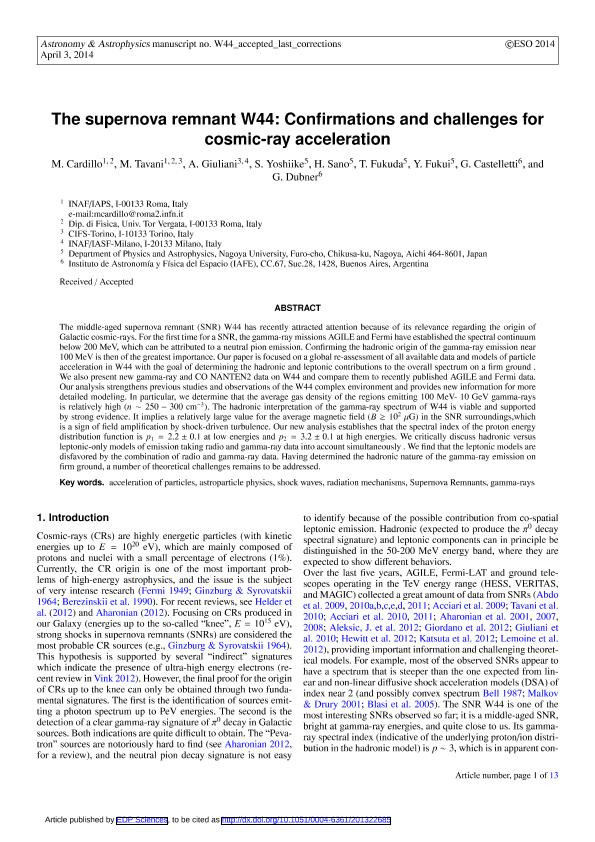Mostrar el registro sencillo del ítem
dc.contributor.author
Cardillo, M.
dc.contributor.author
Tavani, M.
dc.contributor.author
Giuliani, A.
dc.contributor.author
Yoshiike, S.
dc.contributor.author
Sano, H.
dc.contributor.author
Fukuda, T.
dc.contributor.author
Fukui, Y.
dc.contributor.author
Castelletti, Gabriela Marta

dc.contributor.author
Dubner, Gloria Mabel

dc.date.available
2017-05-15T18:29:58Z
dc.date.issued
2014-03
dc.identifier.citation
Cardillo, M.; Tavani, M.; Giuliani, A.; Yoshiike, S.; Sano, H.; et al.; The Supernova Remnant W44: confirmations and challenges for cosmic-ray acceleration; Edp Sciences; Astronomy And Astrophysics; 565; 3-2014; 74-86
dc.identifier.issn
0004-6361
dc.identifier.uri
http://hdl.handle.net/11336/16496
dc.description.abstract
The middle-aged supernova remnant (SNR) W44 has recently attracted attention because of its relevance regarding the origin of Galactic cosmic-rays. The gamma-ray missions AGILE and Fermi have established, for the first time for a SNR, the spectral continuum below 200 MeV which can be attributed to neutral pion emission. Confirming the hadronic origin of the gamma-ray emission near 100 MeV is then of the greatest importance. Our paper is focused on a global re-assessment of all available data and models of particle acceleration in W44, with the goal of determining on a firm ground the hadronic and leptonic contributions to the overall spectrum. We also present new gamma-ray and CO NANTEN2 data on W44, and compare them with recently published AGILE and Fermi data. Our analysis strengthens previous studies and observations of the W44 complex environment and provides new information for a more detailed modeling. In particular, we determine that the average gas density of the regions emitting 100 MeV - 10 GeV gamma-rays is relatively high (n= 250 - 300 cm^-3). The hadronic interpretation of the gamma-ray spectrum of W44 is viable, and supported by strong evidence. It implies a relatively large value for the average magnetic field (B > 10^2 microG) in the SNR surroundings, sign of field amplification by shock-driven turbulence. Our new analysis establishes that the spectral index of the proton energy distribution function is p1 = 2.2 +/- 0.1 at low energies and p2 = 3.2 +/- 0.1 at high energies. We critically discuss hadronic versus leptonic-only models of emission taking into account simultaneously radio and gamma-ray data. We find that the leptonic models are disfavored by the combination of radio and gamma-ray data. Having determined the hadronic nature of the gamma-ray emission on firm ground, a number of theoretical challenges remains to be addressed.
dc.format
application/pdf
dc.language.iso
eng
dc.publisher
Edp Sciences

dc.rights
info:eu-repo/semantics/openAccess
dc.rights.uri
https://creativecommons.org/licenses/by-nc-sa/2.5/ar/
dc.subject
Acceleration of Particles
dc.subject
Astroparticle Physics
dc.subject
Shock Waves
dc.subject
Supernova Remnants, Gamma-Rays
dc.subject.classification
Astronomía

dc.subject.classification
Ciencias Físicas

dc.subject.classification
CIENCIAS NATURALES Y EXACTAS

dc.title
The Supernova Remnant W44: confirmations and challenges for cosmic-ray acceleration
dc.type
info:eu-repo/semantics/article
dc.type
info:ar-repo/semantics/artículo
dc.type
info:eu-repo/semantics/publishedVersion
dc.date.updated
2017-05-02T20:13:42Z
dc.journal.volume
565
dc.journal.pagination
74-86
dc.journal.pais
Francia

dc.journal.ciudad
Paris
dc.description.fil
Fil: Cardillo, M.. INAF/IAPS; Italia. Universita Tor Vergata; Italia
dc.description.fil
Fil: Tavani, M.. Universita Tor Vergata; Italia. INAF/IAPS; Italia. CIFS-Torino; Italia
dc.description.fil
Fil: Giuliani, A.. INAF/IASF-Milano; Italia. CIFS-Torino; Italia
dc.description.fil
Fil: Yoshiike, S.. Nagoya University; Japón
dc.description.fil
Fil: Sano, H.. Nagoya University; Japón
dc.description.fil
Fil: Fukuda, T.. Nagoya University; Japón
dc.description.fil
Fil: Fukui, Y.. Nagoya University; Japón
dc.description.fil
Fil: Castelletti, Gabriela Marta. Consejo Nacional de Investigaciónes Científicas y Técnicas. Oficina de Coordinación Administrativa Ciudad Universitaria. Instituto de Astronomía y Física del Espacio. - Universidad de Buenos Aires. Facultad de Ciencias Exactas y Naturales. Instituto de Astronomía y Física del Espacio; Argentina
dc.description.fil
Fil: Dubner, Gloria Mabel. Consejo Nacional de Investigaciónes Científicas y Técnicas. Oficina de Coordinación Administrativa Ciudad Universitaria. Instituto de Astronomía y Física del Espacio. - Universidad de Buenos Aires. Facultad de Ciencias Exactas y Naturales. Instituto de Astronomía y Física del Espacio; Argentina
dc.journal.title
Astronomy And Astrophysics

dc.relation.alternativeid
info:eu-repo/semantics/altIdentifier/doi/http://dx.doi.org/10.1051/0004-6361/201322685
dc.relation.alternativeid
info:eu-repo/semantics/altIdentifier/url/https://www.aanda.org/articles/aa/abs/2014/05/aa22685-13/aa22685-13.html
Archivos asociados
